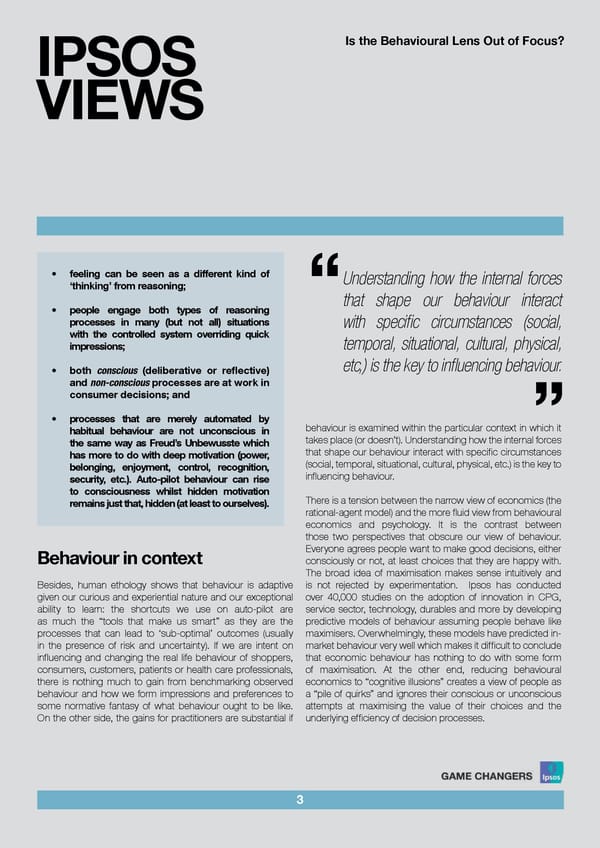IPSOS Is the Behavioural Lens Out of Focus? VIEWS • feeling can be seen as a different kind of Understanding how the internal forces ‘thinking’ from reasoning; “that shape our behaviour interact • people engage both types of reasoning processes in many (but not all) situations with specific circumstances (social, with the controlled system overriding quick temporal, situational, cultural, physical, impressions; “ • both conscious (deliberative or reflective) etc,) is the key to influencing behaviour. and non-conscious processes are at work in consumer decisions; and • processes that are merely automated by behaviour is examined within the particular context in which it habitual behaviour are not unconscious in takes place (or doesn’t). Understanding how the internal forces the same way as Freud’s Unbewusste which that shape our behaviour interact with specific circumstances has more to do with deep motivation (power, (social, temporal, situational, cultural, physical, etc.) is the key to belonging, enjoyment, control, recognition, influencing behaviour. security, etc.). Auto-pilot behaviour can rise to consciousness whilst hidden motivation There is a tension between the narrow view of economics (the remains just that, hidden (at least to ourselves). rational-agent model) and the more fluid view from behavioural economics and psychology. It is the contrast between those two perspectives that obscure our view of behaviour. Everyone agrees people want to make good decisions, either Behaviour in context consciously or not, at least choices that they are happy with. The broad idea of maximisation makes sense intuitively and Besides, human ethology shows that behaviour is adaptive is not rejected by experimentation. Ipsos has conducted given our curious and experiential nature and our exceptional over 40,000 studies on the adoption of innovation in CPG, ability to learn: the shortcuts we use on auto-pilot are service sector, technology, durables and more by developing as much the “tools that make us smart” as they are the predictive models of behaviour assuming people behave like processes that can lead to ‘sub-optimal’ outcomes (usually maximisers. Overwhelmingly, these models have predicted in- in the presence of risk and uncertainty). If we are intent on market behaviour very well which makes it difficult to conclude influencing and changing the real life behaviour of shoppers, that economic behaviour has nothing to do with some form consumers, customers, patients or health care professionals, of maximisation. At the other end, reducing behavioural there is nothing much to gain from benchmarking observed economics to “cognitive illusions” creates a view of people as behaviour and how we form impressions and preferences to a “pile of quirks” and ignores their conscious or unconscious some normative fantasy of what behaviour ought to be like. attempts at maximising the value of their choices and the On the other side, the gains for practitioners are substantial if underlying efficiency of decision processes. 3
 Is the Behavioural Lens Out of Focus? Page 4 Page 6
Is the Behavioural Lens Out of Focus? Page 4 Page 6